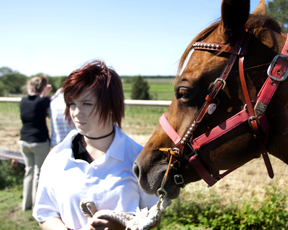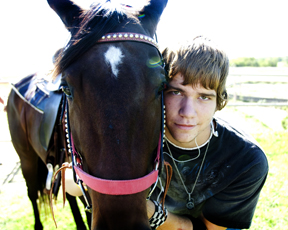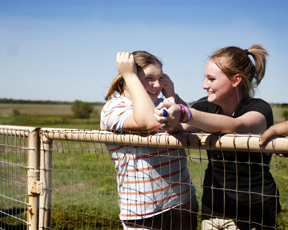Story By Joanna Wuertz
Photos By Daniel Cernero
The weather was unusually mild for Texas, the air barely warm in spite of the bright sun. The grass was still a bit damp from the previous night’s storm. Green fields stretched for miles in all directions. It was a perfect day for riding horses.
You can tell a lot about a person by the way he or she interacts with an animal. Horses can provide peace and tranquility to troubled souls, as evidenced by the teens from Methodist Children’s Home who practiced riding that day.
A cloud of dust blew up as the SUV rolled to a stop on the gravel drive. Suddenly teenagers were piling out, eager to begin Equine Class. Already saddled, the horses stood ready to go. A few of the kids ran forward to pet the animals right away; others hung back, preferring to watch.
One teen adjusted the cinch on his horse’s saddle with practiced ease. Another boy ambled over to a different horse and stroked its head fondly, whispering into one flicking ear.
One by one the students led their horses out to the corral to begin the day’s lesson.
The Methodist Children’s Home serves at-risk youth who don’t necessarily fit the stereotypical definition of an orphan. Some come from abusive homes or homes where the situation is not suitable for raising a child. Others have made choices that are harmful to themselves and to others and need a place to restart.
“It is important to understand that the young people we serve do not come from one zip code, economic group, skin color or area,” Vice President Trey Oakley said. “We have children who are entrenched in cycles of poverty and others whose parents are CEOs or executives. We serve children who have never stepped foot in a church and others whose parents are ministers.”
For a teenager who has had more troubles in life than many kids, the home provides chances to succeed and grow in an environment that is safe from some of the problems they have faced before.
They have adults present who fill the roles of parent or mentor. They go to school daily either at the charter school on campus or at one of the Waco schools. Some get part-time jobs. They have chores and hobbies, extracurricular activities and homework. There are rules and curfews.
The houses on the Methodist Children’s Home campus all vary, depending on the residents and the house parents or staff. Oriented to accommodate 10 to 12 residents, the units bear some resemblance to the typical suburban home. Too large to be called cozy yet not sterile enough to feel like a dorm, their rooms are as unique as the teens living in them.
Posters, photos, doodles and notes adorn the walls. Personal items such as curling irons, books or art supplies are tucked here and there. In one room, someone has built a shrine to SpongeBob Squarepants. In another, the kids are obvious Dallas Cowboys fans.
Ally, a senior in high school living at the home, is active in JROTC and hopes to attend Baylor University someday soon. She has a love for people that she wants to channel into
missions work.
“It is hard to compare my life to that of an adolescent who grew up in an ‘average home.’ It is hard for me to compare because I lack the knowledge and experience and therefore base my assumptions on my observations,” Ally wrote in an e-mail. “But I know that I am not strikingly different in any way. Though my brokenness is heightened, my friends have brokenness, too.”
Ally has lived in Waco for two years, the longest stability she has ever experienced. Her friends and the now-familiar places are important to her healing process.
“I wake up every morning to eight beautiful girls with whom I have shared much laughter, many tears and numerous stories. They are good friends and close sisters, and through our faults, we forgive, grow and struggle,” she explained. “There is often irritation, tears and just simple confusion at the cards that life seem to have dealt us. We express great frustration at our past choices and the choices others made that affected us. We are fighting and embracing community all at once.”
Also in high school, Torie comes from a difficult home life as well.
“Before I moved to Methodist Children’s Home, I was not in a normal family. It was a very broken one. I did not know my mother or my father. I lived with my grandparents and my sister and brother,” she said in an e-mail. “I was going through everything you can possibly think of. My life is very different from those children with a ‘normal’ family. But it is hard to describe how I am different, because I do not really know how a normal family works.”
Torie is in the National Honor Society and plans to get a cosmetology license at McLennan Community College before going on to Texas A&M University to become a veterinary technician. She has internships at Methodist Children’s Home, where she helps with Christmas shopping for the kids they serve, and assists in the Grandparents as Parents Program, a program that helps grandparents who are filling the role of parent to their grandchildren.
“Methodist Children’s Home is a blessing to kids like me who do not have a place to call home, as well as other children who could not stay in their home for a while,” she said. “I am thankful that I have a place to stay because otherwise, I do not know where I would be today.”
Saddiq, another student living at the home, pointed out that “generally, kids are living at Methodist Children’s Home because they have problems. Problems that make them a bit more vulnerable. We have distinct personalities and different cultures. I have learned things here about life, and people in general, that I do not think I could have learned at home.”
Saddiq, an aspiring writer, has not always had the freedom to be himself.
“Coming from a bad neighborhood where I fought every day and had to constantly look over my shoulder and be careful what colors I was wearing was unnerving to say the least,” he remembers.
“Coming here to Methodist Children’s Home where it is easier to relax has been nice.”
Saddiq has made friends since coming to the home, sometimes in spite of himself.
“When I first moved to the Home I was sad to leave my friends from back home. The first few days were hard; I am not a very social person if I have the choice. All the kids bombarded me with questions and it was hard to get to know everyone,” he wrote in an e-mail. “In fact, during my first few days, I tripped and fell, and it was one of the most embarrassing moments of my life. Luckily, my future best friend came along and helped me up. We’ve been close ever since then.”
The Methodist Children’s Home is prepared to field the various challenges that accompany being a young adult with a difficult upbringing or personal problems that need to be dealt with.
At the charter school on the home’s campus, the student-to-teacher ratio is 4 to 1, so students receive the attention that they need to thrive in subjects that may otherwise be difficult for them.
Emphasis is placed on the child’s strengths and how to use them to succeed, instead of concentrating on a weakness that needs to be overcome.

This fall there are 76 graduates from MCH who are currently in college or training programs at varying institutions across the state, including Baylor, the University of Texas at Austin, A&M and the University of North Texas.
Methodist Children’s Home also focuses on restoring the family unit. The residents can receive counseling and healing so that they are able to return to their families.
On other occasions, the home serves as a place to stay for a child whose family is going through a difficult time, anything from a parent with an addiction to parents and children who just can’t get along. There are roughly 180 youth at the Waco campus of Methodist Children’s Home. The average length of stay is 18 months.
Carrie Anderson, the community relations officer, explained a bit about how the home works with families, and with the children as individuals.
“If there’s hope for redemption in the family unit, we strive for that. But we also recognize that there are healthy relationships and there are unhealthy relationships,” she said. “A big part of what we do is helping the children realize what healthy and unhealthy relationships look like.”
The youth at MCH are all a bit like the small group of teens learning to ride that day. Some have conquered their obstacles and eagerly await their chance to climb back on the horse.
Others have reservations, unsure of how to approach things that are unfamiliar. In time, they may grow and gain the confidence they need to ride, too.


